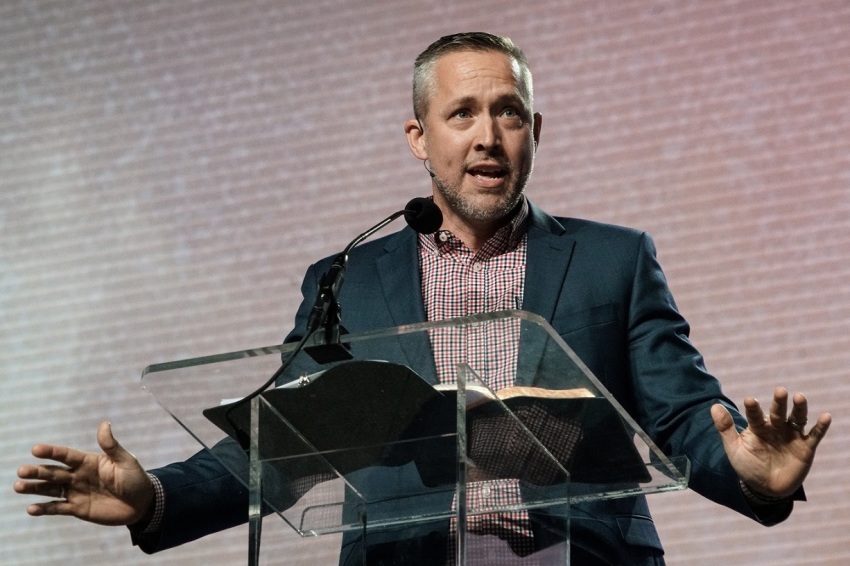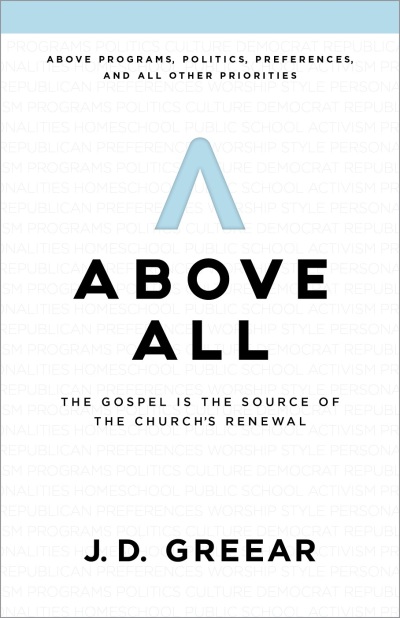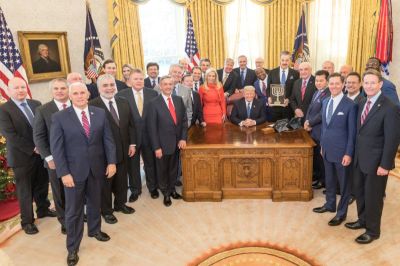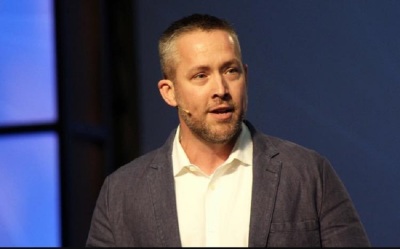SBC President JD Greear talks new book, Trump-supporting evangelicals, and complementarianism

Southern Baptist Convention President J.D. Greear is calling on American churches to put Gospel evangelism “above all” other issues, including politics, social justice and worship preferences.
In the upcoming book, Above All: The Gospel is the Source of the Church's Renewal, the lead pastor of The Summit Church of Raleigh-Durham, North Carolina, exhorts American churches to be more active in evangelism.
“What the church needs now is what the church has always needed — a return to the Gospel. This isn’t nostalgia for a bygone age. I’m not, in the words of one pundit, 'sacrificing the future in search of the past,' and I’m not trying to make anything great again. What I am trying to do is show us that the only way to save the future is by going back to the very beginning,” wrote Greear.
“This book is intended to be a wrenching look at how secondary things — quite often good things, sometimes even necessary things — have displaced the Gospel as the main focus in the life of the church.”
In an interview with The Christian Post on Tuesday, Greear explained that he believed it's “not that most churches in the West have made any kind of conscious decision to go away from the Gospel,” but rather allowed “secondary things” to be elevated as “the essential thing.”
“In First Corinthians 15, Paul says that the Gospel was of first importance to him. First importance implies that there are other important things in the church. And there certainly are. And Paul talked about a lot of things, but this one is of first importance,” said Greear.
“It’s got to be what we’re characterized by; it’s got to be what we’re identified by. I believe the Gospel should both be the source of the church’s power and renewal and … the proclamation of the Gospel ought to be the focus of our mission.”
Greear also said that while things like “community ministry” and “social justice” can be “really good,” nevertheless doing them “without Gospel proclamation” is only “making people more comfortable as they’re headed to Hell.”
“Politics is another one,” he added. “I think politics is very important, but I know that for me to get involve in political agendas would hinder my ability to preach the Gospel to all people.”
“I’ll always tell our church, ‘I might be wrong about global warming, but I’m not wrong about the Gospel.’ So I don’t want to let my opinions about the former ever keep people from hearing me on the latter. So I will deliberately show some restraint in how I talk about things so that I can make sure that people have plenty of bandwidth and opportunity to hear the Gospel.”
CP talked with Greear about his new book, plus other topics like how evangelical churches should respond to the 2020 election cycle and how The Summit Church seeks to follow the complementarian model of church leadership while also allowing women to serve as teachers. Here are excerpts from the interview.

CP: In the book, you talked about how in order to multiply the church, pastors need to shift their focus from "seating capacity" to "sending capacity." What advice would you give pastors who focus on seating capacity to shift to sending capacity?
Greear: There’s often a false dichotomy put forward in churches in the West, and that is some churches focus on growing wide and other churches focus on growing deep. And it almost seems as though they are mutually exclusive.
So even the church conference circuit, you got conferences that are designed to have you grow your church and you’ve got ones that are focused more on taking your people deep.
What I believe from studying the Bible is that depth and width are never at odds and that those who grow wide without growing deep are not really as wide as they think are, because Heaven counts disciples, not converts.
And those who grow deep without growing wide are probably not as deep as they think because depth and the Gospel always leads to an urgency in evangelism. And if we’re ever going deep with Jesus, and it’s not leading us to reach out wide in our witness and our serving and our meeting need, it means that we’re not really as deep in the Gospel as we probably think we are.
CP: In Chapter 5, you wrote: "evangelicals have lost a lot of moral authority in recent years because of our apparent willingness to wink at sin when it serves our interests." Would you say this has been a bigger problem in 2016 as opposed to earlier years like the 1980s or has this always been an issue with evangelicals in politics?
Greear: Well, typically what happens is these kinds of situations they don’t create problems in us, they reveal them. And what we’ve seen, I think, is that some of us are too willing to go along with sin if we feel like it strategically works out well for us.
I am not trying to say that anybody who voted for Trump or anybody that votes for any candidate, I am not trying to say that they are hopelessly compromised. But I am saying that when we are willing to excuse and even brush away, when we’re willing to not preach about sin because we’re afraid that it will somehow put us out of favor with the powers that be, well that shows that we’ve got our priorities out of order, the Gospel is not above all. It shows that we’ve got power above all or we’ve got influence above all.
I certainly think that candidates in both political parties who are not Christians, I think both of them can advocate helpful and unhelpful things. And I think sometimes we have to, politically we have to choose which is going to be better for the country. Sometimes that means voting for a candidate who you don’t agree with everything they say or do, but that’s not the same as capitulating to those parties and failing to say, “thus says the Lord.”
Adrian Rogers was a great Southern Baptist leader of the past. He was invited to the White House several times during the Reagan administration. Sometimes he went, but he was always very clear that “I don’t come here to be a stooge on the stage for you, to be a good photo-op to make it look like hey, the church is behind you.” He said, “I come here as a prophet of God to say thus says the Lord. And I will speak affirmatively on the things that you are doing that are consistent with peace and biblical principles and the areas that are not, I will say thus says the Lord the other way.”
I just want to make sure that we can keep our conscience and keep clarity on those things. Put the Gospel above all, not political influences.

CP: What do you believe evangelical churches should do differently in the 2020 election cycle as opposed to 2016?
Greear: We have to be clear on the things that we disagree with as much as we champion the things that we agree with in our particular candidate.
A friend of mine named George Yancey, he’s an African-American sociologist, he said, “I don’t have a problem with a Christian who evaluates all the different things at stake in the election and believes that Trump is the better of the two options.” He says, “I don’t have a problem with that, but if that’s you, your voice ought to be the loudest one speaking out against things that Trump says or does that are damaging to other people in ways that trouble you.”
He said, “because if people know that you voted for them … I’m not faulting you for doing that, but you need to be clear that you’re not OK with these other things.”
If you feel like that at the end of the day Trump is the right one or the better of the options, be clear about the dignity of the immigrant. Be clear about the need for righteousness and purity in our leaders. Be clear about how much you dislike him speaking in a way that denigrates other people and doesn’t respect their dignity, whether it is political opponents or people from other nations.
On the other side, if at the end of the day you look at it and feel like whoever the Democratic candidate is, you feel like that of all the different things, this is the better of the options, well that’s great. Make sure you’re clear about the wickedness of abortion. Make sure you’re clear about the preciousness of religious liberty and the right of conscience, and the fact that people need to have the dignity to make their own choices and to provide for themselves. Just make sure you’re clear about whatever it is that is on the other side from where you voted.
CP: In Chapter 8, you covered the "worship wars" and how you believe that worship service preferences are still one of the big reasons why people "either leave our church for another or come to us from a different one." What do you believe are ways a church can curb departures based on worship preferences?
Greear: The sense in which we have a certain kind of worship that culturally resonates with how we want to express ourselves, there’s nothing wrong with that. But what I think is problematic is when that particular style becomes more important than the mission of our church. I tell people that our church’s music is not necessarily my favorite. ... Because I’m the one who has the most influence here, I don’t just try to make my preferences what we do. We’re asking the question, "what helps us best reach the people we’re trying to reach" and we’re always running it through that grid.
What helps reach this community? And if it means going more modern and contemporary, then that is what you should do. If it means adding more Gospel or more so-called ethnic flair during your music, then man that’s what you should do. If it means going more traditional, that's what you should do.

CP: Moving away from the book, as I understand back in March you announced your church's intention to draft an official paper on allowing women an expanded role in teaching. What is the status of this effort and how do you respond to the claim that this goes against biblical standards for the roles of women in the church?
Greear: Functionally, there is a paper I have out right now on my blog called “Can Women Teach in the Church?” That is the essence of it. What we’re talking about is a more polished version of it. And we’ll probably put that out in early July.
There’s not anything substantively different in it than what’s in that article, “Can Women Teach in the Church?” or what we’re not already practicing. Basically, it’s trying to say that there’s been a false dichotomy put forward in the church, we think, in the complementarian world. And that is you’re either an egalitarian who believes that women and men have no distinctive roles in the church or you assume that women can only do secondary roles, that leadership gifts are not as important to them.
What we believe is that women have access to the same spiritual gifts that men do. They don’t use them in the same roles that men use them in, but they have the same gifts, and we need to be as devoted to platforming and elevating their gifts as we are those of our sons. In order for the church to thrive, both our sons and daughters have to thrive.
It’s meant that we have looked through all of our staff positions and asked: "can a woman do this position without having to have the authority of an elder? Can a non-elder, a non-pastor elder do this job?" If so then we would say, maybe we traditionally only consider men for this job. But we should consider people of both genders [for this other job] because it can be done without the authority of a pastor or an elder.
We don’t want to have our position where she either occupies a role as a pastor-elder or even implies that she does. So we have also chosen that because the Sunday morning sermon is so closely associated with the authority of the church, we don’t have a woman that delivers that sermon. We believe that that would be a violation of 1 Timothy 2.
However, we’ve had women who’ve shared during the Sunday morning service in ways that showed that they were not the ultimate teaching authority.
Women ought to be using their teaching gifts and writing, [but] in a way that respects the order of 1 Timothy 2 and 3 that doesn’t either occupy pastor-elder or functionally look like they are.



























